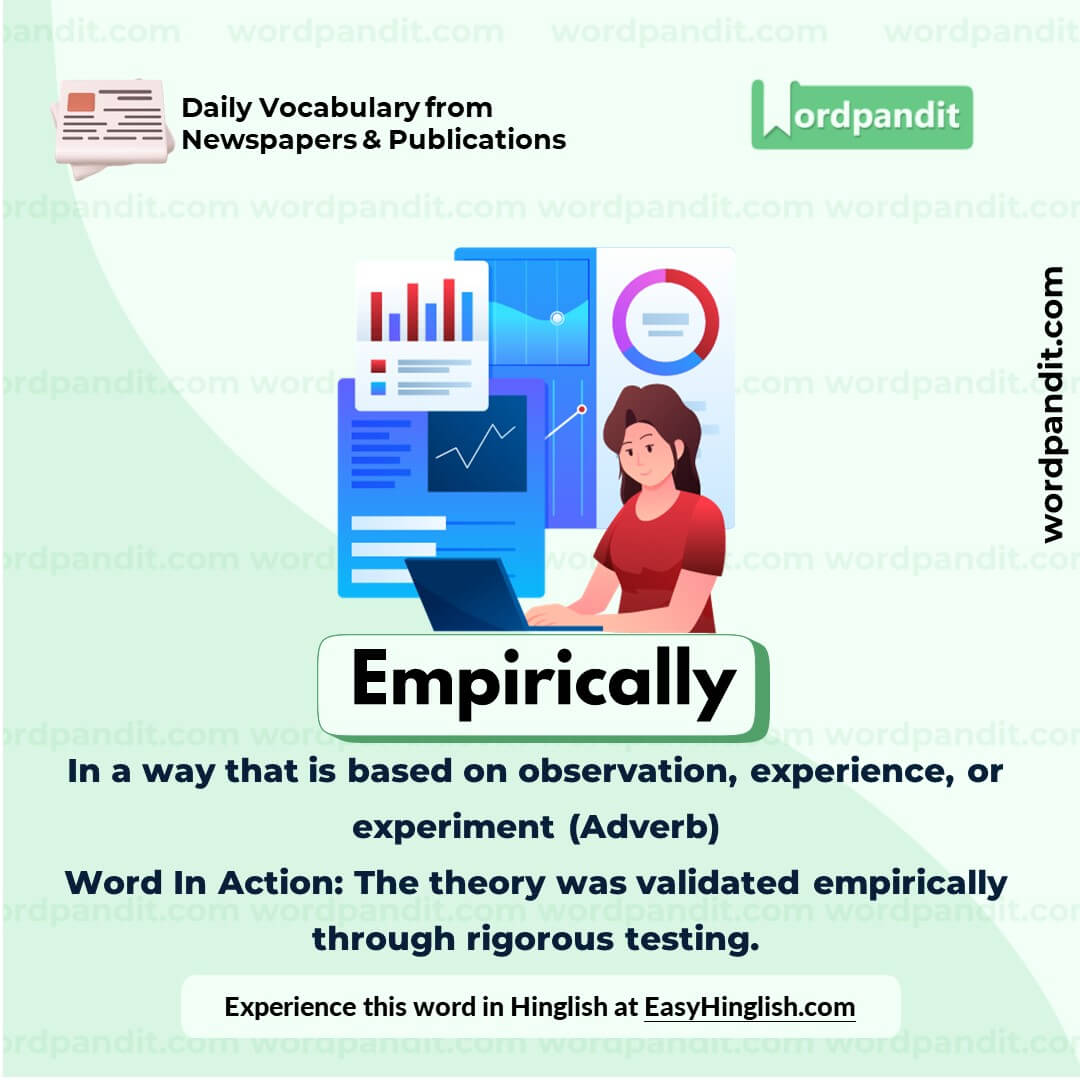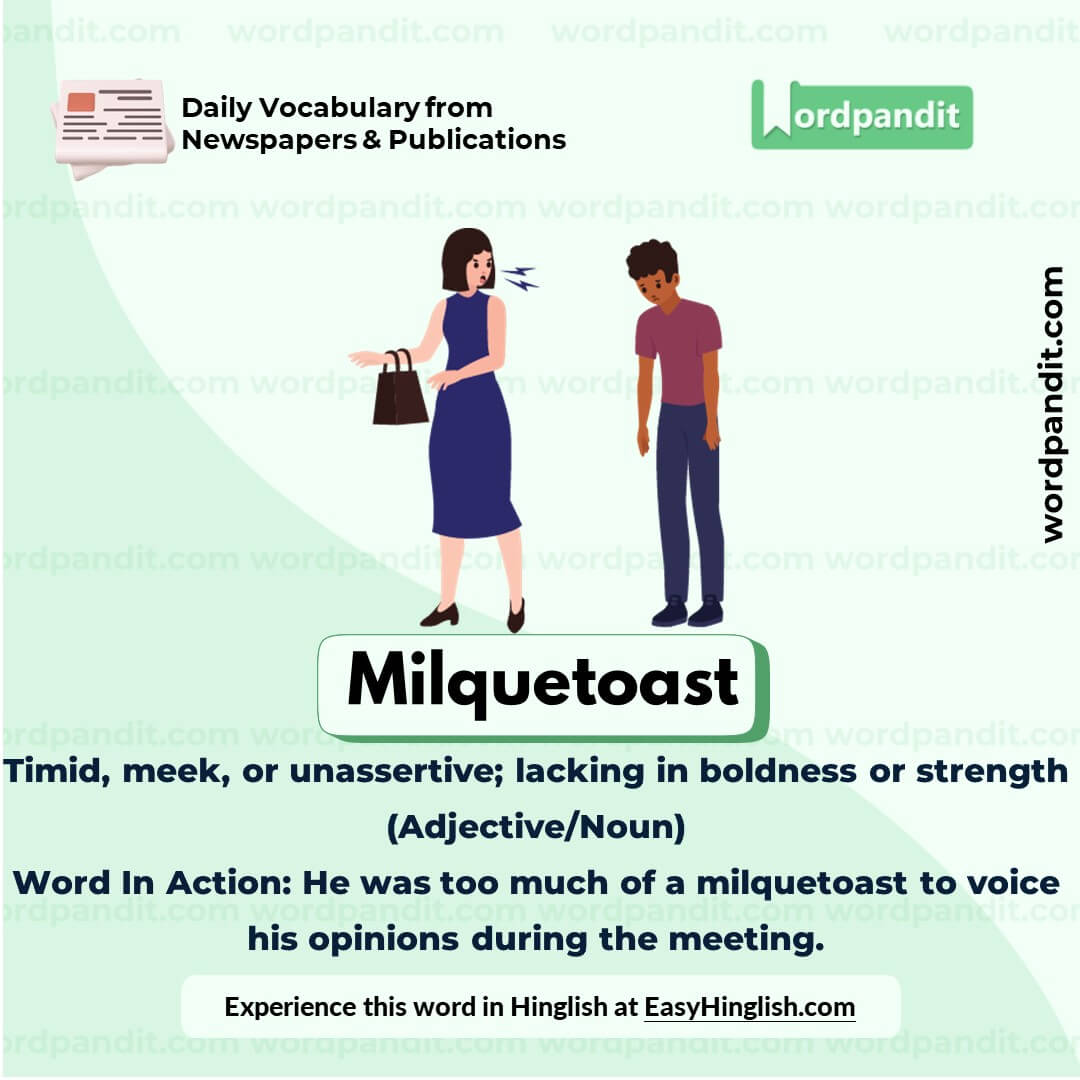Daily Vocabulary from International Newspapers and Publications
Expand Your Vocabulary with Wordpandit’s Global Vocabulary Hub
At Wordpandit, we are committed to helping you develop a truly global vocabulary by drawing from some of the most respected international publications. This section is designed to keep you ahead of the curve by introducing you to words that define global conversations and trends.
The Power of Global Sources
To help you think and communicate on a global scale, we curate vocabulary from renowned international sources, such as:
- The New York Times
- The Washington Post
- BBC
- The Guardian
- The Economist
- Scientific American
- Psychology Today
- And many more...
Stay Global, Stay Competitive
Our daily updates from international publications ensure you are consistently exposed to new words that reflect global news and developments, making sure your vocabulary is not only current but also globally relevant.
Enhance Your Global Perspective
Whether you’re preparing for international exams, aiming to excel in global business communication, or want to enhance your language skills for personal growth, Wordpandit offers the resources you need to thrive in a global context.
Effective Learning, Global Reach
Our learning methodology combines global examples, memory aids, and interactive activities, allowing you to internalize new words effectively and apply them in real-world scenarios.
Begin Your Global Vocabulary Journey Now!
Why Choose Wordpandit?
Practical Learning: Focus on words you'll actually encounter in real-world reading, enhancing your comprehension and communication skills.
Diverse Content: From current affairs to scientific breakthroughs, our varied sources expose you to vocabulary across multiple domains.
Effortless Integration: Make Wordpandit a part of your daily routine. Just a few minutes each day can significantly boost your lexicon over time.
Your Path to Vocabulary Mastery
- Visit our Daily Vocabulary section regularly
- Explore new words and their usage in context
- Practice incorporating these words into your own writing and speech
- Track your progress as your vocabulary expands
Start Your Journey Today
Embark on your vocabulary enhancement journey with Wordpandit. By consistently engaging with our daily posts, you'll build a robust vocabulary that serves you well in academic, professional, and personal contexts.
Remember, a word a day keeps linguistic limitations at bay. Make Wordpandit your daily companion in the quest for vocabulary excellence!
WORD-1: Succumbing
Context:
"But it ought to be possible to do so without succumbing to bogus claims about machine minds." - Aeon
Explanatory Paragraph:
The word "succumbing" refers to yielding or giving way to a force, influence, or temptation, often after resisting. In this context, it describes the act of surrendering to unsubstantiated claims about artificial intelligence.
Meaning: To give in to pressure, temptation, or negative forces (Verb)
Pronunciation: suh-KUHM-ing
Difficulty Level: ⭐⭐⭐ Intermediate
Etymology: Derived from the Latin "succumbere," meaning "to fall down" or "yield," from "sub-" (under) and "cumbere" (to lie).
Synonyms & Antonyms:
Synonyms: Yielding, capitulating, surrendering, relenting
Antonyms: Resisting, overcoming, withstanding, defying
Usage Examples:
- After hours of negotiation, the team found themselves succumbing to the client's demands.
- She fought valiantly but eventually succumbed to the temptation of chocolate cake.
- The general refused to succumb to the enemy, even as defeat seemed inevitable.
- Many succumb to stress when faced with high-pressure deadlines at work.
Cultural Reference:
"Succumbing to despair is a theme commonly explored in literature, such as in the character of Winston Smith in George Orwell's 1984, who ultimately gives in to the oppressive regime." - Literary Analysis
Think About It:
What are some strategies people can use to avoid succumbing to pressure in challenging situations?
Quick Activity:
Write a short paragraph about a situation where someone succumbs to a challenge, incorporating the word "succumbing" appropriately.
Memory Tip:
Think of "succumb" as "sub" + "cave in" — giving way under pressure, like a roof that succumbs to heavy snow.
Real-World Application:
In professional life, "succumbing" is often used to describe moments when individuals or groups yield to pressures such as peer influence, market forces, or ethical dilemmas.
WORD-2: Entrained
Context:
"The story of technology – from prehistory to now – has always been that of the ways we are entrained by the tools and systems that we ourselves have made." - Aeon
Explanatory Paragraph:
The term "entrained" refers to being brought along, guided, or synchronized with a process or influence. In this context, it suggests that human behavior and thinking are shaped or directed by the tools and systems we create, often without realizing it.
Meaning: To be drawn in, synchronized, or influenced by an external force or system (Verb)
Pronunciation: en-TREYND
Difficulty Level: ⭐⭐⭐ Intermediate
Etymology: Derived from the French "entraîner," meaning "to drag along" or "carry forward," from "en-" (in) and "traîner" (to drag).
Synonyms & Antonyms:
Synonyms: Synchronized, absorbed, aligned, carried
Antonyms: Detached, independent, disaligned
Usage Examples:
- The dancer's movements were entrained to the rhythm of the drumbeat.
- Employees often find their behaviors entrained by the culture of the organization they join.
- In nature, circadian rhythms are entrained by the cycles of light and dark.
- Technology has a way of entraining our habits and even our thinking patterns.
Cultural Reference:
"In the film 2001: A Space Odyssey, human behavior appears entrained by the presence of advanced, enigmatic technologies, highlighting the profound influence of tools on society." - Film Critique
Think About It:
How can individuals resist being unconsciously entrained by the systems they interact with daily, such as social media algorithms?
Quick Activity:
Write a short paragraph explaining how a routine in your life might be entrained by external influences, such as work schedules or digital devices.
Memory Tip:
Think of "entrained" as "in train" – being carried along by the momentum of something, much like a train pulls its cars forward.
Real-World Application:
The concept of being "entrained" is vital in understanding how social media platforms, workplaces, or cultural trends subtly shape our decisions and behaviors over time.
WORD-3: Empirically
Context:
"Turing proposed that we replace the meaningless question Can machines think? with the empirically decidable question Can machines pass [what has come to be known as] the Turing test?" - Aeon
Explanatory Paragraph:
The word "empirically" refers to a method or approach based on observation, experience, or experiment rather than theory or pure logic. In this context, Turing emphasizes evaluating machines through measurable and observable outcomes, like their ability to pass the Turing test, instead of debating abstract notions.
Meaning: In a way that is based on observation, experience, or experiment (Adverb)
Pronunciation: em-PEER-ik-lee
Difficulty Level: ⭐⭐⭐ Intermediate
Etymology: From the Greek "empeirikos," meaning "experienced," via Latin "empiricus," relating to knowledge gained through observation and practice.
Synonyms & Antonyms:
Synonyms: Experimentally, observationally, practically
Antonyms: Theoretically, hypothetically, speculatively
Usage Examples:
- The effectiveness of the new medication has been empirically demonstrated through clinical trials.
- Her claims about the benefits of meditation are supported empirically by decades of scientific research.
- Engineers often solve problems empirically by testing prototypes in real-world conditions.
- Many scientific theories must be validated empirically before gaining widespread acceptance.
Cultural Reference:
"The scientific method, which relies on empirically gathered data, has revolutionized our understanding of the natural world since the time of Galileo and Newton." - History of Science
Think About It:
What are the advantages and limitations of relying solely on empirical evidence in fields like artificial intelligence and philosophy?
Quick Activity:
Write a short paragraph about a personal experience where you made a decision based on empirical evidence rather than intuition or assumptions.
Memory Tip:
Remember "empirically" by associating it with "experience" — both start with "e" and involve evidence from the real world.
Real-World Application:
Empirical methods are crucial in disciplines like medicine, engineering, and data science, where decisions and innovations rely on rigorous testing and observation.
WORD-4: Milquetoast
Context:
"They rely unchecked on one-sided, indeed, milquetoast conceptions of human activity, skill and cognitive accomplishment." - Aeon
Explanatory Paragraph:
The word "milquetoast" refers to someone or something that is timid, meek, or lacking in assertiveness or strength. In this context, it describes a weak or unassertive view of human abilities and achievements, implying it is overly cautious or bland.
Meaning: Timid, meek, or unassertive; lacking in boldness or strength (Adjective/Noun)
Pronunciation: MILK-toast
Difficulty Level: ⭐⭐⭐⭐ Advanced
Etymology: Derived from a 1920s American comic strip character, Caspar Milquetoast, who epitomized timidity and passivity. The name itself is a humorous play on "milk toast," a bland, soft food.
Synonyms & Antonyms:
Synonyms: Timid, meek, passive, bland, unassertive
Antonyms: Bold, assertive, confident, strong-willed, daring
Usage Examples:
- His milquetoast approach to leadership failed to inspire confidence among his team.
- The movie’s protagonist begins as a milquetoast character but transforms into a courageous hero by the end.
- Critics lambasted the policy as a milquetoast attempt to address a serious issue.
- The debate became heated, leaving no room for milquetoast opinions.
Cultural Reference:
"Caspar Milquetoast, the comic strip character created by H.T. Webster, became a cultural symbol of extreme timidity, influencing the use of 'milquetoast' in English to describe passive personalities." - American Pop Culture
Think About It:
In what situations might a milquetoast approach be considered a strength rather than a weakness?
Quick Activity:
Write a dialogue where one character accuses another of being "milquetoast" and the accused defends their approach.
Memory Tip:
Associate "milquetoast" with "milk toast" — a bland, uninspired dish — to remember its meaning of timidity or lack of boldness.
Real-World Application:
The term "milquetoast" is often used in critiques of leadership, creative work, or decision-making to emphasize the need for assertiveness and strength in action.
WORD-5: Surreptitious
Context:
"The surreptitious substitution (to use a phrase of Edmund Husserl’s) of this thin gruel version of the mind at work – a substitution that I hope to convince you traces back to Alan Turing and the very origins of AI – is the decisive move in the conjuring trick." - Aeon
Explanatory Paragraph:
The word "surreptitious" describes actions performed secretly or stealthily, often to avoid detection or criticism. In this context, it refers to the subtle, hidden replacement of a rich understanding of the mind with an oversimplified version in the discourse about artificial intelligence.
Meaning: Done secretly, stealthily, or in a way that avoids attention (Adjective)
Pronunciation: suh-rep-TISH-us
Difficulty Level: ⭐⭐⭐⭐ Advanced
Etymology: From the Latin "surrepticius," meaning "stolen" or "secretly obtained," derived from "sub-" (under) and "rapere" (to seize).
Synonyms & Antonyms:
Synonyms: Secret, stealthy, covert, clandestine, furtive
Antonyms: Open, overt, transparent, public, conspicuous
Usage Examples:
- The spy carried out surreptitious surveillance to gather intelligence on the enemy.
- She made a surreptitious glance at her phone during the meeting to check the time.
- The cat's surreptitious approach allowed it to sneak up on the bird unnoticed.
- His surreptitious behavior raised suspicions among his colleagues.
Cultural Reference:
"In J.R.R. Tolkien's The Hobbit, Bilbo Baggins’ surreptitious acquisition of the One Ring from Gollum sets the stage for the events of the entire Middle-earth saga." - Literary Analysis
Think About It:
When might surreptitious actions be justified, and when might they be harmful or unethical?
Quick Activity:
Describe a situation in which a surreptitious act might be necessary, and write a sentence using "surreptitious."
Memory Tip:
Link "surreptitious" to "sneaky substitution" — both words start with "s" and imply secret actions.
Real-World Application:
Surreptitious behavior is often discussed in contexts such as espionage, corporate secrecy, or discreet personal actions, making it relevant in both fictional and real-life narratives.


















